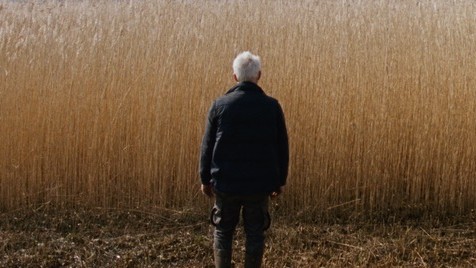Nature, light, darkness, mundane rituals, violence, ambiguity, and evil, in such forms as death, tribalism, and xenophobia. They all come together in sensuous, haunting, and claustrophobic cinematic form in Reedland (Rietland), Dutch writer-director Sven Bresser’s debut feature, which premiered in the Cannes Critics’ Week on Wednesday during the Cannes Film Festival.
“When reed cutter Johan discovers the lifeless body of a girl on his land, he is overcome by an ambiguous sense of guilt,” reads a synopsis for the movie, produced by Viking Film and starring non-professional actors, led by Gerrit Knobbe. “While taking care of his granddaughter, he sets out on a quest to track down evil. But darkness can thrive in unexpected places.”
The film, featuring Sam du Pon’s cinematography, is set in the same type of rural landscape in which Bresser grew up, but in a different part of the Netherlands. The Party Film Sales is handling sales on the movie.
“For me, it started with the landscape, a landscape that I knew my whole life and that doesn’t exist anymore in my native village where I grew up, where it used to be,” Bresser, whose first short The Summer and All the Rest premiered at the Venice Film Festival 2018 and won the best short film award at the Netherlands Film Festival, tells THR. “In this quest for the same kind of landscape, I found these wetlands in the north part of the Netherlands, where the community is still living off the reed.”
The filmmaker can explain where the sense of dread and claustrophobia comes from when watching the movie. “One of the first images that I ever had for this film was just this man walking or working in the reeds and looking back over his shoulder,” he recalls. “This image, looking back over the shoulder as prey or as a predator, this ambiguity, popped into my head.”
Slow, extended, repeated visuals of mundane routines also fit the sense of uneasiness that permeates Reedland. “These routines and rituals, I think, are really the heart of the film,” Bresser tells THR. “Filming rituals gives me a lot of pleasure, because they have their own inner logic. They don’t need storytelling. If you give them the time, and you do it with the right mise en scene, they can become something poetic and ritualistic. They connect you to the mundane, to reality, and at the same time, they can transcend the mundanity of daily life and have this poetic quality. Cinema is really a great medium to capture rituals and routines.”
Bresser cast Knobbe, who had no acting experience, because he felt he had all he was looking for in Johan. “It’s hard to explain, but you kind of [fall] in love with somebody who could maybe play a character in your film,” he says. “When I met him, I had a little bit of this feeling that I had already known this man for a long time. He’s a very, very special person to work with, but also just as a human being.”
Nature sometimes seems to reflect how the protagonist in Reedland feels on the inside, but at other times, it feels like its own character that doesn’t care much about what humans may think. How does Bresser think about the relationship between nature and humans? “These are exactly the questions that I was busy with, and maybe still am,” he replies. “This man is so connected to the land. It’s a cultivated landscape, so it only exists by the hands of humans who cut the reed. We don’t have real wild nature anymore in lots of parts of Europe. And yeah, in the film, it’s becoming almost an inner landscape, a reflection of his state of mind and this alienating conflict between good and evil.”
At the same time, “this indifference for human suffering from nature itself, which is just being there, was something that also fascinated me from the start,” Bresser shares, pointing to Dutch painter, sculptor and writer Armando’s concept of a “guilty landscape.” Explains the director: “Almost all his work was surrounded by this poetic notion and his questions about how nature can go on after horrific events happened in a place.”
Speaking of guilt, Johan’s reed-cutting village featured in Bresser’s story has a long-running rivalry, even conflict, with the so-called “Trooters” on the other side of the lake. This us-versus-them sentiment sheds light on nationalism and xenophobia. “It’s very timely and timeless at the same time,” Bresser tells THR. “You always try to project a darkness or an evil side of human beings onto a community that is not yours. This very human way of thinking, this question ‘is evil coming from outside or from within’ was there with the first image that I described, this man looking over his shoulder.”
Does the phrase “Trooter” actually exist? “It was a mocking name for a neighboring village of where I grew up. There was this rivalry, but it’s a relic of the past,” Bresser says. “But I really wanted to render this tribalism in a more radical way.”

